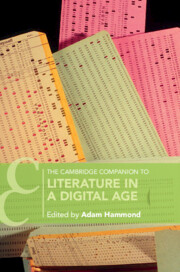Book contents
- The Cambridge Companion to Literature in a Digital Age
- The Cambridge Companion to Literature in a Digital Age
- Copyright page
- Contents
- Figures
- Contributors
- Chronology
- Introduction
- Chapter 1 Literary Data
- Chapter 2 Literary Change
- Chapter 3 The Canon
- Chapter 4 Voice and Performance
- Chapter 5 The Archive
- Chapter 6 Editions
- Chapter 7 Materiality
- Chapter 8 The Literary Marketplace
- Chapter 9 Fanfiction, Digital Platforms, and Social Reading
- Chapter 10 Narrative and Interactivity
- Chapter 11 Generated Literature
- Chapter 12 Literary Gaming
- Chapter 13 The Printed Book in the Digital Age
- Chapter 14 Literature’s Audioptic Platform
- Chapter 15 Critique
- Index
- Cambridge Companions To Literature
Chapter 2 - Literary Change
Published online by Cambridge University Press: 29 November 2024
- The Cambridge Companion to Literature in a Digital Age
- The Cambridge Companion to Literature in a Digital Age
- Copyright page
- Contents
- Figures
- Contributors
- Chronology
- Introduction
- Chapter 1 Literary Data
- Chapter 2 Literary Change
- Chapter 3 The Canon
- Chapter 4 Voice and Performance
- Chapter 5 The Archive
- Chapter 6 Editions
- Chapter 7 Materiality
- Chapter 8 The Literary Marketplace
- Chapter 9 Fanfiction, Digital Platforms, and Social Reading
- Chapter 10 Narrative and Interactivity
- Chapter 11 Generated Literature
- Chapter 12 Literary Gaming
- Chapter 13 The Printed Book in the Digital Age
- Chapter 14 Literature’s Audioptic Platform
- Chapter 15 Critique
- Index
- Cambridge Companions To Literature
Summary
Literary historians generally explain change by narrating it. Narrative history excels at identifying individual events, authors, and works that exemplify transformations of literary culture. On the other hand, narrative often struggles to represent continuous trends. Since numbers are designed to describe differences of magnitude, quantitative methods can trace a curve and give a more nuanced picture of gradual change. As quantitative methods have become more common in literary studies, it has become clear that many important aspects of literary history are in fact gradual processes extending over relatively long timelines. But there have also, certainly, been moments of rapid change – in some cases initiated by a single book or author. More crucially, readers seem to want the kind of meaning produced by narration. Thus, quantitative methods are never likely to entirely replace a periodized narrative; they merely provide an alternative mode of description.
- Type
- Chapter
- Information
- The Cambridge Companion to Literature in a Digital Age , pp. 34 - 46Publisher: Cambridge University PressPrint publication year: 2024

